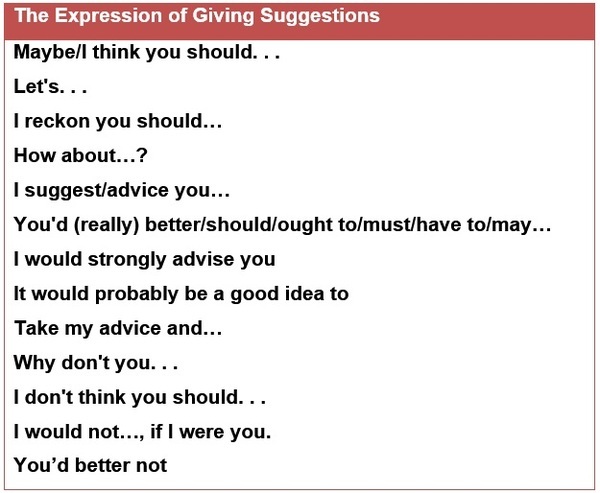Read more
Suggesting & Warning (Context: Natural Disaster)
Objectives
By the end of this lesson you are
expected to be able to identify the expressions to use when giving suggestions
and warning especially in the context of natural disaster.
Learn about it!
We live in a
tropical country where flood, drought, and wildfire are the possible natural
disasters that haunt, including volcanoes and earthquakes. The natural disaster
affects the people life time to time, to the extent to the quite extreme
changes of seasons. In hot season, drought ruins the crops and farms, and the
wildfire destroys thousands of acres of woods. Meanwhile in the rainy season,
most people in some areas get flooded out because of the incessant rain.
However, here you are not going to
identify any natural disaster, yet you will learn some expressions of giving
suggestion and warnings in the context when the natural hazards are ‘haunting’.
Let’s identify some expressions of giving suggestions and warnings from the conversations
as follow in this session.
Ari: Mom, I am going out for a bit.
Mom: Where are you going this early, son?
Ari: I need to visit Ani. Her house flooded when the river near burst last
night.
Mom: Take my advice and tell her family to move to higher ground immediately,
and they better not wait to gather belongings.
Ari: Okay, Mom. I’ll tell them.
Mom: And for you too, be careful. Take care when you drive!
Ari: Got it, thank you, Mom. I am off now.
What do you find from the dialogue?
Could you identify the expressions of suggesting and warnings?
In the dialog Ari asked for
permission to visit and help Ani, whose house got flooded out. His mom gave
suggestion to Ani and family of what to do or how to react. Look at the bold
italic clauses.
Take my
advice and tell her family to move to higher ground immediately, and they
better not wait to gather belongings.
Besides, his mom also warned Ari to
be careful on his way.
....be
careful. Take care when you drive!
So, what is
suggestion? And how is it different from warnings?
Giving suggestion means you mention
some ideas or possible action for other people to consider. Meanwhile when you
want the other people to understand that there could be possible danger or
problem in what they are doing, you give then warnings.
Here you are provided some
expressions to use when giving suggestion and warnings
Do you understand?
To ease your understanding, listen
to the following conversation and identify the expressions used.
What
suggestion did Ana give to Bobi?
Could you identify the expression?
In the dialog, Ana suggested doing
the clean-up as soon as possible to avoid more damage by the floodwaters. Yeah,
here is the expression of giving suggestion that A exactly said:
I would
strongly advise you to do it as soon as possible if you do not want the
floodwaters to damage your home furniture more.
Listen to the dialog one more time,
and check the expression:
Ana : How is your home
condition after the flood?
Bobi : Since my home has been flooded severely, I need to do a major cleanup.
Ana : I would strongly advise you to do it as soon as possible if you do not
want the floodwaters to damage your home furniture even more.
Bobi : Yeah, you are right.
Jawablah pertanyaan-pertanyaan berikut dengan jujur dan bertanggungjawab!
| No. | Pertanyaan | Jawaban | |
|---|---|---|---|
| 01. | Saya mengetahui arti kata-kata pada pada teks di atas |
Ya | Tidak |
| 02. | Saya bisa mengucapkan kata-kata sesuai dengan audio/video yang disajikan |
Ya | Tidak |
| 03. | Saya bisa memperagakan percakapan dengan membaca teks yang tersedia |
Ya | Tidak |
| 04. | Saya bisa memperagakan percakapan dengan sedikit membaca teks |
Ya | Tidak |
| 05. | Saya bisa memperagakan tanpa membaca teks |
Ya | Tidak |
| 06. | Saya bisa memperagakan tanpa membaca teks disertai dengan variasi baru atau pengembangan teks |
Ya | Tidak |
| 07. | Saya bisa membuat karya video terkait dengan percakapan yang diperagakan |
Ya | Tidak |
| 08. | Saya bisa membuat video dan telah disosialisasikan pada sosial media yang saya miliki |
Ya | Tidak |
Bila ada jawaban "Tidak", maka segera lakukan review pembelajaran, terutama pada bagian yang masih "Tidak".
Bila semua jawaban "Ya", maka Anda dapat melanjutkan ke pembelajaran berikutnya.
Buatlah jurnal harian untuk membantumu dalam mempercepat proses pembelajaran dengan menjawab soal evaluasi diri berikut ini.
- Apakah yang kamu telah pelajari pada bagian ini?
- Apa yang menarik pada sesi ini?
- Apa kendala yang kamu alami?
- Apa yang kamu lakukan untuk mengatasi kendala tersebut?





